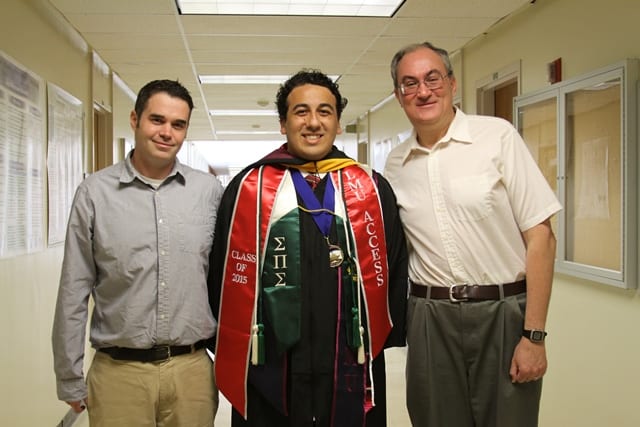
Senior year was quite memorable for physics major Rhys Taus. In April, he received an undergraduate research award for his senior thesis, a project on gravity surrounding black holes, from the American Physical Society. In October, Taus presented the same project — although the work was not as complete at the time — to the Society for the Advancement of Hispanics/Chicanos & Native Americans in Science (SACNAS) Conference in Los Angeles and won a student presentation award.
The dual awards cap a fulfilling four years at LMU, Taus says. He chose LMU after being named a McNair Scholar, a program established to increase graduate degree awards for students from underrepresented groups, and got a good feeling about his choice for college beginning with his first visit to campus.
“When I visited the school, I liked the physics faculty I spoke with,” he says. “I knew the faculty was going to be there for the students.”
The project on gravity around black holes began after a discussion with Taus’ mentor, Jonas Mureika, a professor of physics. The theory challenges the idea of gravitational singularity in black holes and speculated on the effects on orbits if mass is stretched over a larger area.
The project challenged Taus; he is not completely at ease with theoretical physics, calling the math “a little weird” for his tastes. But his project has scored big. At the SACNAS conference, judges recognized his communication skills while the American Physical Society judges praised his composure during questioning.
“They liked the clarity and that I didn’t get defensive about the work,” Taus says. “I was open to saying ‘I’m not quite sure.’ ”
Having had a successful taste of theoretical physics, Taus will now turn his attention to experimental physics, pursuing a doctorate in particle physics at the University of Rochester.
He dreams of someday working at CERN (the European Council for Nuclear Research) but also envisions circling back to his alma mater. Taus credits close relationships with his professors for his positive college experience. The notion that LMU’s professors were approachable was something he learned before his first day of classes when he attended the school’s three-week ACCESS (A Community Committed to Excellence in Scientific Scholarship) program in the summer before his freshman year.
“That taught us to interact with professors and that they are not these scary people in their offices,” he says. “Many students at other schools don’t get a chance to hang out with their professors.”
Someday, he would like to return the favor.
“Preferably I want to be a professor at an institution similar to LMU or maybe even LMU — some place where I have the opportunity to do research but also interact with students,” he says. “A lot of the interaction I had with professors motivated me and put me on this path to graduate school.”



